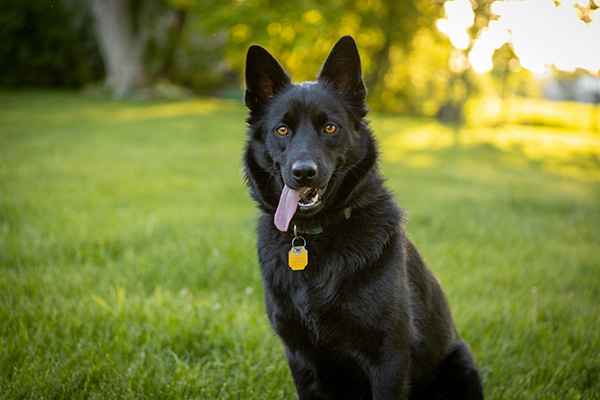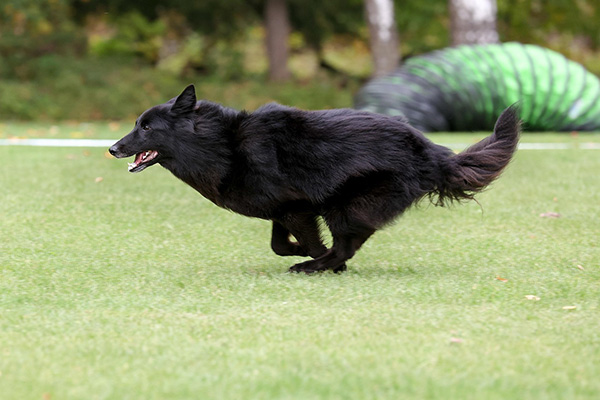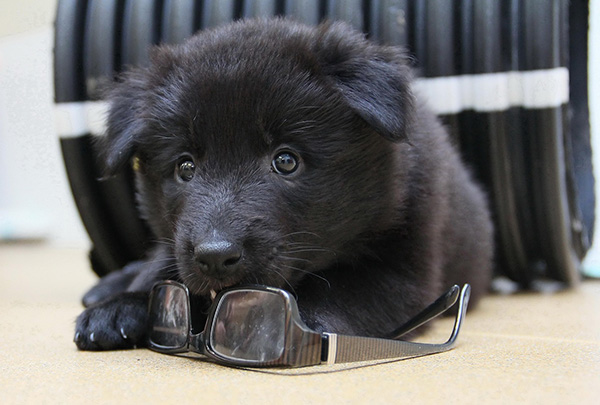The Belgian Sheepdog is an intelligent and versatile dog herding breed from Belgium. This breed thrives in multiple roles, including herding, guarding, search-and-rescue missions, and excelling in competitive dog sports. With their sleek black coats, keen intelligence, and boundless energy, Belgian Sheepdogs are both stunning and highly trainable. Due to their energetic temperament and need for mental challenges, they are better matched with owners with dog-handling experience.
This guide covers all you need to know about the Belgian Sheepdog, including its background, personality, care requirements, and training tips.
Breed Characteristics
Temperament | Protective, loyal, alert |
Intelligence | High |
Affection/Friendliness | Loving with family, reserved with strangers |
Trainability | Highly trainable |
Mental Stimulation | High – agility, obedience, herding, puzzle toys |
Exercise Needs | High – daily running, hiking, fetch, herding games |
Apartment Living | Not suitable |
Family Friendly | Yes, with proper training |
Pet Friendly | Moderate, best with early socialization |
Drooling Level | Low |
Energy Level | high |
Loneliness Tolerance | Low |
Adaptability | Moderate |
Tendency to bark | High |
origin
Belgian Sheepdogs have a long history of being versatile and hardworking companions. They originated as native shepherd dogs in Belgium in the late 19th century and were one of four distinct types of the Belgian Shepherd Dog, along with the Belgian Malinois, Belgian Tervuren, and Belgian Laekenois. Known for their sharp intelligence, agility, and protective instincts, these herding dogs were highly valued for guarding livestock.
Their long history of service expanded during World War I and World War II, where they served as messenger dogs, ambulance dogs, and even in military patrols. Today, Belgian Sheepdogs continue to excel as working dogs, participating in obedience competitions, search-and-rescue, and as loyal family companions.
The Belgian Sheepdog breed is recognized by major kennel clubs worldwide, including the American Kennel Club (AKC), the United Kennel Club (UKC), and the Fédération Cynologique Internationale (FCI). The Belgian Sheepdog Club of America and the Sheepdog Club of America also celebrate this breed for its elegance, intelligence, and working ability.

Breed Overview
Height: 24–26"
Weight: 65–75 lbs
Height: 22–24"
Weight: 60–70 lbs
Breed Group
Herding
Life Span
12-14 years
Coat
Double, straight, dense
Coat Length
Long
Hypoallergenic
No
Shedding Level
High
size
The Belgian Sheepdog is a medium to large-sized breed, known for its elegant and athletic build. Male Belgian Sheepdogs generally reach a height of 24 to 26 inches and weigh between 65 and 75 pounds. Females are a bit smaller, usually standing 22 to 24 inches tall and weighing 60 to 70 pounds.
personality
The Belgian Sheepdog's personality is brimming, making it a standout companion for the right owner. Highly intelligent and quick to learn, this breed performs exceptionally well in obedience, agility, and advanced training activities. With their abundant energy, they need plenty of physical exercise and mental challenges to remain content and well-balanced. They are alert and confident, often serving as excellent watchdogs, but this can lead to a moderate to high bark level when they sense something amiss.
Belgian Sheepdogs are naturally protective of their families, making them loyal guardians. However, they are not overly aggressive; their protectiveness is balanced by their sociability when properly socialized. While they are not overly independent, they do have a strong work ethic and prefer having a job to do.
temperament

Belgian Sheepdogs are typically warm and loving toward their family members, making them great companions in a nurturing home. However, their strong herding drive and high energy can lead them to attempt herding behaviors with small children or other pets, so consistent training and supervision are essential.
When it comes to strangers, Belgian Sheepdogs tend to be reserved and cautious. They are naturally protective and may act aloof until they feel comfortable. Early socialization plays a key role; they can become comfortable and relaxed around new people with the proper exposure.
Belgian Sheepdogs often live harmoniously with other dogs and cats, particularly when they are brought up together. While their herding instincts might cause them to chase smaller animals, consistent training can help control this behavior. They usually interact well with fellow dogs, but their confident demeanor may call for supervision during playtime.
Diet / Nutritional Needs
Belgian Sheepdogs require a well-rounded diet of high-quality protein sources like chicken, beef, or fish to fuel their active lifestyle and maintain muscle mass. Healthy fats, including omega-3 and omega-6 fatty acids, help promote a glossy coat and support joint health, while complex carbohydrates, such as sweet potatoes, offer lasting energy.
Portion control is important to avoid obesity, as this medium-sized breed may be prone to overeating. Feeding two measured meals daily to adult Belgian sheepdog and ensuring access to fresh water are recommended. Belgian Sheepdog puppies should be fed three times daily. Consult your veterinarian to customize your dog's diet based on age, weight, and activity level.
Activity / Exercise

The Belgian Sheepdog is a highly active and energetic breed that needs both physical and mental stimulation. Originally bred for herding and work, they need at least 1-2 hours of intense daily exercise to remain happy and healthy. Activities like running, hiking, agility training, or playing fetch in a fenced yard are ideal to burn off their energy. Without sufficient exercise, they can become bored and develop destructive behaviors, which is especially important for first-time dog owners to note.
Mental stimulation is just as important for this sharp Belgian Shepherd. Activities like puzzle toys, obedience training, or learning advanced tricks help keep their minds active and ward off boredom. They excel in dog sports like herding trials, flyball, or scent work, showcasing their versatile dog nature. Their dark brown eyes and triangular ears reflect their alertness and eagerness to learn, making them quick learners in obedience competitions.
Appearance / Colors
The Belgian Sheepdog is a stunning and athletic breed known for its unique appearance. It has a well-proportioned, muscular build, a lean yet strong body, a proud posture, and a graceful gait. Its medium size and athletic frame make it both agile and powerful, perfect for its role as a working dog.
The breed's most striking characteristic is its rich double coat, which is dense, medium-length, and gently wavy. The long coat is straight and flowing, while the dense undercoat is soft and thick, providing insulation against harsh weather. The Belgian Sheepdog’s coat is always solid black, though some may have small white markings on the chest or toes, which are acceptable but not preferred in show standards. Their triangular ears and dark brown eyes add to their alert and regal expression, making them a truly captivating Belgian Shepherd dog.
grooming needs
The Belgian Sheepdog's thick double coat needs regular grooming to stay healthy and tang-free. Weekly brushing removes loose fur, prevents mats, and distributes natural oils. Daily brushing may be required to manage the extra hair during shedding periods in spring and fall. Bathing should occur every 6-8 weeks, using a mild dog shampoo to preserve the coat's shine and texture.
Focus on areas such as the ears, paws, and tail, where tangles are more prone to develop. Regular nail trimming, ear cleaning, and dental care should also be included in their grooming routine to maintain overall health.
adaptability
The Belgian Sheepdog is a highly intelligent and versatile breed, but its adaptability depends largely on its environment and lifestyle. While it can adjust to various living situations, it thrives best in homes with ample space and access to outdoor activities. Given its high energy and need for frequent exercise and mental engagement, it is not ideal for small apartments or inactive lifestyles.
Belgian Sheepdogs are sensitive to their surroundings and can struggle with anxiety if left alone for long periods or without proper engagement. They adapt well to active families or individuals who can provide consistent training, socialization, and plenty of physical and mental challenges. In a suitable environment, they are loyal and flexible companions.
trainability
The Belgian Sheepdog is renowned for its exceptional trainability, thanks to its high intelligence, eagerness to please, and strong work ethic. This breed excels in obedience, agility, and advanced training, making it a favorite for dog sports and working roles like search-and-rescue or police work. They are fast learners who excel with mental challenges, but due to their sensitivity, they respond best to positive reinforcement, including treats, praise, and play. Harsh training methods can cause anxiety or resistance.
Consistency and patience are key, as their herding instincts and high energy can sometimes make them easily distracted. Early socialization and consistent training are crucial to directing their intelligence and energy toward positive behaviors. The Belgian Sheepdog becomes a highly trainable and adaptable companion with the right approach.
life expectancy
With proper care, a balanced diet, and regular veterinary visits, the Belgian Sheepdog typically lives for 12 to 14 years.
cost

The cost of a Belgian Sheepdog from a reputable breeder typically ranges from $1,500 to $3,000, depending on factors like pedigree, location, and breeder reputation. The price usually covers initial vaccinations, health screenings, and occasionally early training. However, adopting a Belgian Sheepdog from a rescue or shelter is a more cost-effective choice, with adoption fees typically ranging from $200 to $600. While rescue dogs may not come with detailed lineage, they often make equally loving and loyal companions. Adopting also offers the rewarding benefit of giving a deserving dog the opportunity for a second chance at a loving home.
Potential Health Issues
The Belgian Sheepdog is typically a strong and healthy breed, but like all working dogs, they can be susceptible to certain health concerns. Below are some of the most common conditions to watch out for:
Hip Dysplasia
Hip dysplasia is an inherited disorder in which the hip joint does not form properly, which can lead to arthritis or movement difficulties. It is frequently seen in medium to large dog breeds, such as the Belgian Sheepdog. Regular exercise, maintaining a healthy weight, and feeding high-quality dog food can help manage this condition. Responsible breeders typically perform health screenings through organizations like the Orthopedic Foundation for Animals (OFA) to reduce the likelihood of hip dysplasia in offspring.
Elbow Dysplasia
Elbow dysplasia, much like hip dysplasia, impacts the elbow joints and can lead to discomfort or lameness. Early identification through routine veterinary visits and appropriate care is crucial for effectively managing this condition. Ensuring your Belgian Sheepdog gets ample exercise without overexertion can help maintain joint health.
Progressive Retinal Atrophy (PRA)
Progressive retinal atrophy (PRA) is a degenerative condition affecting the eyes that may result in gradual blindness. Regular eye exams with a veterinary ophthalmologist can help track the progression and manage the condition effectively. While there is no cure, early detection can help you prepare and adapt your home to support a visually impaired dog.
Epilepsy
Epilepsy is a neurological condition that can lead to seizures in Belgian Sheepdogs. Although it can be controlled with medication, it necessitates ongoing care and supervision. If your dog exhibits signs of seizures, seek veterinary advice promptly to create an appropriate treatment plan.
Hypothyroidism
Hypothyroidism occurs when the thyroid gland fails to produce sufficient hormones. This can result in weight gain, fatigue, and skin problems. Proper medication and routine veterinary visits can effectively manage this condition. A balanced diet and monitoring your dog’s weight can also help prevent complications.
